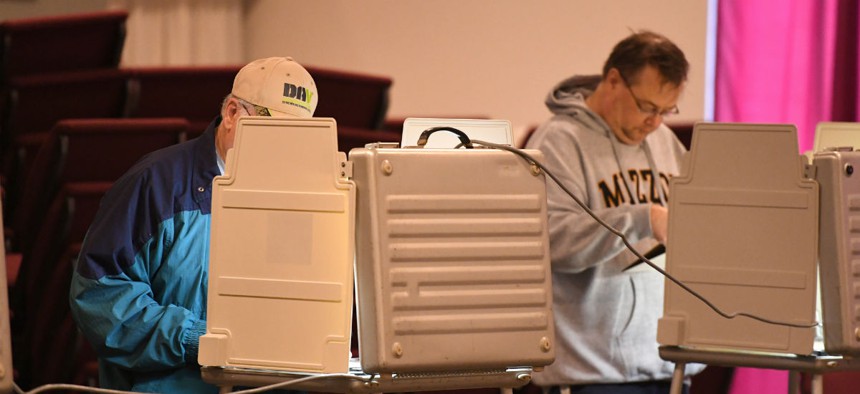
Voters in St. Louis during the 2016 presidential election. Gino Santa Maria/Shutterstock.com
House Republicans Want to Eliminate Federal Election Assistance Agency
“The happiest people out there would be the hackers,” says a former official at the Justice Department’s Voting Section.
House Republicans are taking aim at a small federal agency that helps provide election oversight and guidance, saying its functions are no longer necessary.
A spending bill from the House Appropriations Committee unveiled Thursday would give the Election Assistance Commission 60 days to terminate itself. The small agency was created after the tightly contested 2000 presidential election. It has an annual budget of about $10 million and had just 31 employees on its rolls as of March. The agency writes election management guidelines and develops specifications for testing and certifying voting systems, among other tasks.
The House Administration Committee first proposed the elimination earlier this year before the fiscal 2018 appropriations bill also slated the agency to shutter its doors. Republicans argued during a markup Thursday the agency was always intended to be temporary and other federal offices, such as the Federal Elections Commission, could easily assume its responsibilities.
Democrats introduced an amendment at the markup to save the agency, arguing that its role was more important than ever given the attempts by the Russian government to interfere with the 2016 election. Republicans rejected that line of thinking, noting the Homeland Security Department, and not EAC, has jurisdiction over election-related cybersecurity issues.
Brenda Bowser Soder, an EAC spokeswoman, said the agency has been “active in the conversation around cybersecurity for a long time.” EAC, she explained, provides cybersecurity experts with information on election processes. She added the agency helps to increase voting access, boost security and update election equipment.
Rep. Mike Quigley, D-Ill., the author of the EAC amendment, said the proposal would mark a step backward for the country.
Eliminating the agency “would be dramatically out of step with the federal government’s work to improve the nation’s election systems,” Quigley said. “No other federal agency has the capacity, willingness or expertise to effectively absorb these functions.”
Rep. Tom Graves, R-Ga., chairman of the Financial Services and General Government Subcommittee that was considering the measure, said EAC is simply a go-between for various other agencies.
“It’s just there to help agencies talk to one another,” Graves said, “and I don’t think we need a federal agency to do that.” He noted Democrats were using the agency to advance a broader platform aimed at increasing the federal government’s role in the election process, but said it should be left primarily to states to run their own voting systems.
Richard Hasen, a law professor at University of California, Irvine, founding co-editor of the Election Law Journal and author of the Election Law Blog, said it would be a “tremendous mistake” to assume other agencies would take on EAC’s duties. The role of the FEC, for example, has become much more complicated in recent years while also getting increasingly deadlocked by political leadership. Hasen noted the fight to eliminate the EAC is not a new one, as House Republicans view the agency as federal infringement on an inherently state and local function.
“Even though it has no real power,” Hasen said, alluding to EAC’s voluntary guidance, Republicans “say it’s too powerful.”
Adam Ambrogi, the Democracy Fund’s director of Elections Programs, said 47 states currently test their elections systems at the federal level through EAC, providing significant savings. Prior to the 2000 election, EAC’s functions were housed in FEC. The agency’s expertise and relationships were in campaign finance, however, meaning the three-employee election administration office was ignored. Ambrogi said state election officials need a distinct federal agency to turn to for assistance with people who actually have experience running elections, which EAC currently offers.
David Becker, a former senior litigator at the Justice Department’s Voting Section and the executive director of the Center for Election Innovation and Research, said EAC has been particularly busy lately.
"They are traveling around and speaking right now to county election officials across the country,” Becker said, adding the agency has been “extremely active” on recent threats. If it is eliminated, he said, “The happiest people out there would be the hackers.”
Rep. Matt Cartwright, D-Pa., said at the appropriations markup that EAC provides subject matter expertise to states and other agencies and helps improve voting access for military personnel and other Americans overseas, and the disabled.
Those functions, Cartwright said, “Would not be carried over to the FEC. They would simply cease to exist.”
Bowser Soder said she was unaware of how Congress would reassign EAC’s responsibilities if Congress eliminated it. She said the agency would not lobby lawmakers, but she defended its mission.
“We feel we play a unique role in serving election officials and voters and we’ll continue to do that as long as we’re around,” she said, adding, “We hope to continue that for a long time.”
In his fiscal 2018 budget proposal, President Trump proposed eliminating 19 independent federal agencies. EAC, however, was not one of them.
Mitch Herckis contributed to this report.
Image via Gino Santa Maria/Shutterstock.com.







